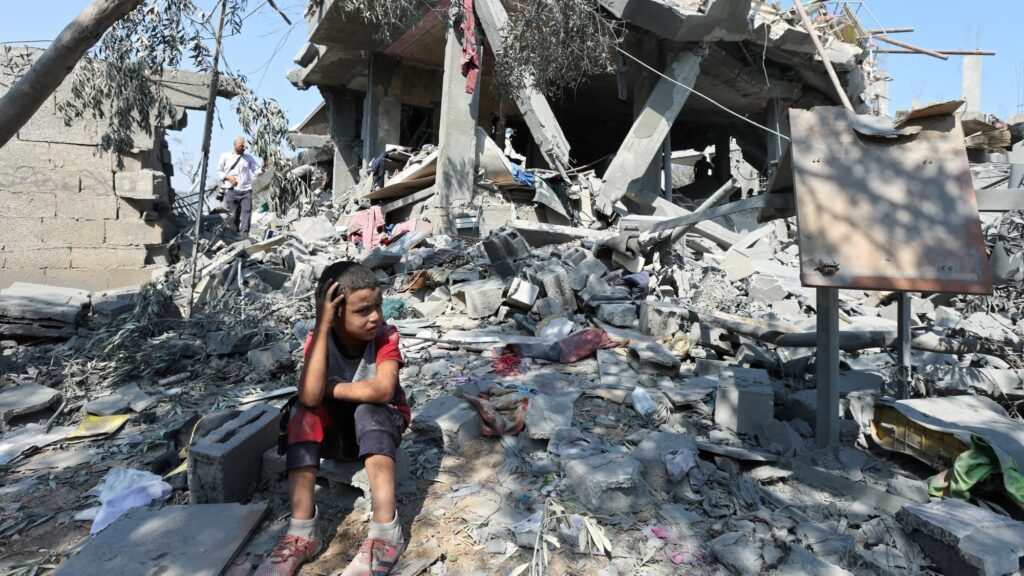GAZA CITY, Gaza Strip — Ceasefire negotiations between Israel and Hamas resumed Saturday in Doha, even as Israel escalated its most intense bombing campaign in months, killing hundreds and preparing for a major new ground assault across Gaza.

Palestinian health authorities reported at least 146 people were killed Saturday alone in what has become one of the deadliest three-day periods since the March truce collapsed. Hospitals are overwhelmed with the wounded, and many civilians remain trapped beneath rubble amid the bombardment.
The renewed Israeli campaign, dubbed “Operation Gideon’s Chariots,” follows President Donald Trump’s recent visit to the Middle East. Israel says the operation aims to secure new territory inside the Gaza Strip. It has also blocked all humanitarian supplies into the enclave since early March, intensifying a crisis now threatening famine for Gaza’s 2.3 million residents.
Reuters journalists witnessed Israeli tanks positioned along Gaza’s perimeter, while civilians fled northern towns, using carts to carry what belongings they could.
“They are bombing houses, and the people are afraid. What should we do?” said 50-year-old Imad Naseer as he escaped the violence. “They treat us as if we are animals, not as humans.”
Taher Al-Nono, spokesperson for the Hamas political bureau, confirmed that indirect ceasefire talks with Israel resumed in Doha on Saturday. He said Hamas had reaffirmed its core demands: an end to the war, prisoner exchanges, a full Israeli withdrawal from Gaza, and the restoration of humanitarian aid.
Israeli Defence Minister Israel Katz acknowledged the negotiations but insisted they were not contingent on a ceasefire or the lifting of Israel’s blockade. Israel remains focused on rescuing hostages still held by Hamas since the October 2023 attacks.
Israel’s military said it was conducting “extensive strikes” and mobilizing for “operational control” of strategic zones across the enclave. Gaza health officials said Saturday’s casualties were concentrated in Beit Lahiya, Jabalia refugee camp, and the southern city of Khan Younis, where at least 459 others were injured.
Residents had been told to evacuate northern Gaza on Friday, but many had nowhere to go. In a statement, Hamas described the onslaught as a “systematic campaign of extermination” and urged Arab leaders gathered in Baghdad for an emergency summit to intervene and ensure aid reaches Gaza’s population.
Efforts to restore a ceasefire have repeatedly failed since March. Hamas has long maintained that it would only release Israeli hostages if Israel agrees to halt its offensive. Israel, for its part, says it will not stop until Hamas is dismantled.
At the Arab League summit, Egyptian President Abdel-Fatah al-Sisi condemned Israel’s campaign as a strategy to “obliterate” Palestinians and “end their existence in the Gaza Strip.”
According to Gaza’s health ministry, more than 53,000 people have been killed since the war erupted in October 2023. Israeli officials say their goal remains the complete destruction of Hamas’ military and governing infrastructure following the group’s October 7 attacks that left roughly 1,200 Israelis dead and 250 kidnapped.
The United Nations has warned that famine is imminent in Gaza, a crisis worsened by Israel’s supply blockade and the destruction of key infrastructure. U.N. aid chief Tom Fletcher recently asked the Security Council whether it would act to “prevent genocide.”
Israel argues that food deliveries made during a six-week truce earlier this year should be sufficient and blames Hamas for allegedly stealing aid—an accusation the group denies.
Hospitals, many repeatedly struck by airstrikes, are barely operational. Marwan Al-Sultan, head of the Indonesian Hospital in northern Gaza, reported dozens of deaths overnight and warned that “the situation inside the hospital is catastrophic.”
On Friday, President Trump acknowledged the deepening crisis, stating, “a lot of people are starving” in Gaza. A U.S.-backed initiative is preparing to begin food distribution in the enclave by late May using private American security contractors, though the U.N. has declined to cooperate due to concerns over impartiality.
Meanwhile, NBC News reported that the Trump administration is considering a plan to permanently relocate up to one million Palestinians from Gaza to Libya—a proposal that has been met with fierce opposition from every major Palestinian political faction.
As the war nears its 20th month, the death toll rises, the humanitarian crisis deepens, and diplomatic solutions remain elusive, the fate of Gaza’s besieged population hangs precariously in the balance.



